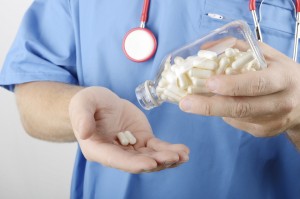 Those of us in the world of complementary medicine have been speaking about the dangers of statin medications for as long as I can remember them being on the market. But the powers that be in the medical community (i.e., the big drug companies and the docs whose back pockets those drug companies routinely grease) continue to entertain the notion that statin meds are just fine. And it’s no big deal that they’re so common…they’re even in the drinking supply.
Those of us in the world of complementary medicine have been speaking about the dangers of statin medications for as long as I can remember them being on the market. But the powers that be in the medical community (i.e., the big drug companies and the docs whose back pockets those drug companies routinely grease) continue to entertain the notion that statin meds are just fine. And it’s no big deal that they’re so common…they’re even in the drinking supply.
Meanwhile, more and more research points to their ability to cause diabetes, liver damage, memory loss, muscle wasting, chronic pain, and more. (Just type “statins” in the search bar in the upper-right corner on the drpescatore.com homepage, and you’ll find plenty of evidence of that, backed up by research.)
To that end, a new review shows that statins may have negative effects on the heart and blood vessels.
Isn’t protecting your heart and blood vessels the reasons why these poisons are recommended in the first place? This binocular vision is what makes me want to pull the hair out of my head (luckily, I still have all my hair!).
In this latest study, Japanese scientists reported that statins inhibit the synthesis of vitamin K2. Why is this important? K2 plays an important role in activating a protein called MGP (matrix Gla protein), which helps stop cardiovascular calcification.
In other words, vitamin K2 helps stop the hardening of the arteries. So, by inhibiting vitamin K2 synthesis in the body, statins may actually cause heart disease…the exact thing they are supposed to prevent.
There are two main forms of vitamin K: K1 and K2. Vitamin K1 is found in green leafy vegetables like broccoli and spinach. K1 accounts for about 90 percent of the vitamin K intake in a typical Western diet. Vitamin K2 is synthesized in the gut by your microflora (yet another reason why it’s important to maintain healthy gut bacteria by taking a diverse probiotic). And K2 only accounts for about 10 percent of our total vitamin K intake.
Up until now, I typically have only recommended supplementing with vitamin K2 for the few patients I have who insist on staying with their statin medications. In addition to those who need to improve their bone health.
Well, starting today, I will be using it to promote cardiovascular health in all of my patients, not just those on statin medications. The type of K2 I recommend is MQ-7, which has been shown to improve K2 levels the most effectively in the blood and tissues.
But wait, this study gets even better. The authors also note that statins also inhibit the biosynthesis of selenium-containing proteins, including the antioxidant enzyme glutathione peroxidase, which reduces oxidative stress.
I’ve spoken quite a bit about why reducing oxidative stress is absolutely critical for your health. That’s because oxidative stress damages your cell walls, which ages your body and increases the risk for everything from wrinkles, to diabetes, to cancer.
Glutathione is so important for health that I have many patients who come to the office just to get this intravenously (as it’s notoriously hard to be effective when taken by mouth). Glutathione is critical for the health of everything from the eyes to the brain.
Now, I am going to quote the researchers because I couldn’t have said it any better myself:
“[…] the epidemic of heart failure and atherosclerosis that plagues the modern world may paradoxically be aggravated by the pervasive use of statin drugs.”
How much do I love these guys? It’s time we take our lives back from the irritable statins.
Statin use has been increasing rapidly over the last few decades, rising from 2 percent of adults 45 years of age and over in 1988-94 to 25 percent in 2005–2008, according to the National Center for Health Statistics. Good for big pharma–us, not so much.
The bottom line: there has been no evidence published for over a decade that can unequivocally say that statins are effective in preventing heart disease. Bring this to your cardiologist next time you see them.
Source:
“Statins stimulate atherosclerosis and heart failure: pharmacological mechanisms.” Expert Review of Clinical Pharmacology, March 2015, Vol. 8, No. 2, Pages 189-199
http://www.nutraingredients-usa.com/Research/Should-vitamin-K2-also-be-recommended-for-statin-users

